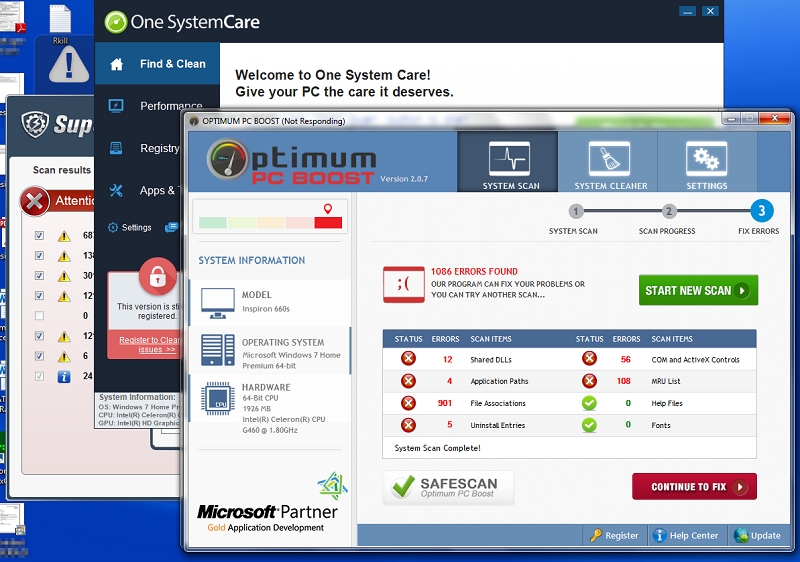Avoiding Viruses and Malware in Windows 7¶
Getting computer viruses can be a real hassle:
- They can make your computer slow and cause it to crash.
- They can steal your personal information.
- They can hold your personal data for ransom.
- They can get you in trouble with your Internet Service Provider.
- They can be expensive to remove. Computer Recycling charges a minimum of $25 to clean computer viruses. At other computer shops you can easily spend twice that much money.
- They can take a lot of time to remove. Sending your computer off to have viruses removed can leave you without a computer for days or weeks.

The above computer was infected by three different fake antivirus programs. It took hours to clean them all off. You don’t want to end up in this situation!
It is much better to avoid being infected by a computer virus than to clean up after one. This document outlines some easy steps you can take to reduce your risk of being infected. The tips are in rough order of importance. We will focus on tips that are both effective and easy to implement.
Although these tips will reduce your risk of computer viruses, there is no way to guarantee that you will avoid them completely. New viruses are being invented all the time, and the techniques used to spread viruses are becoming more clever. However, the tips in this document will help protect you against some of the more common threats.
When we talk about “computer viruses” in this handout, we are actually talking about all the kinds of malware that can get on your computer. Technically some kinds of malware are not viruses, but we don’t have to worry about that distinction in this handout.
Some of the tips here are specific to the Windows 7 computers we sell at Computer Recycling.
You might find some of the advice in this guide confusing or difficult to understand. Please contact us at Computer Recycling if you are confused so we can help you understand what is going on.
- Avoiding Viruses and Malware in Windows 7
- Use Windows Update and Ninite
- Use standard accounts for daily use
- Do your backups
- Be careful about downloads
- Use Ninite for common downloads
- Install an ad blocker
- Be careful about email attachments
- Be careful about links in email
- Be careful about links in social media
- Be careful where you download software
- Be careful about downloading games
- Avoid toolbars
- Avoid tuneup software and registry cleaners
- Avoid pirated software and key generators
- Keep your antivirus up to date
- Develop a support network
- Other strategies to protect yourself
- What are viruses and malware?
- About this documentation